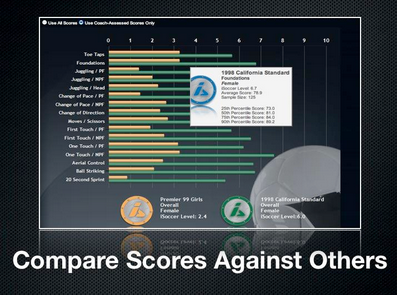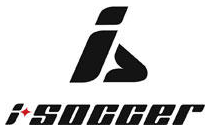iSoccer Helps Soccer Players Improve
Technology Helps Motivate Soccer Players By Challenging Them To Do Better.
SoccerToday chats with Scott Leber, CEO of iSoccer and former professional soccer player with Columbus Crew. Leber was a star youth soccer player and was named 1997 Gatorade High School Player of the Year before going on to play soccer at Stanford where he graduated with a degree in industrial engineering.

iSoccer is an online software development tool for soccer players. iSoccer‘s assessment evaluates 16 soccer skills and scores players on performance. iSoccer says, “Know your level today so you can set goals to raise your level tomorrow.” Soccer players all have a level and “now it is time to raise it! Train harder at practice and at home!” Sounds like a great idea, how does it work?
SoccerToday: What is the idea behind iSoccer?
Scott Leber: “To motivate players to play more soccer. Before iSoccer, I used to coach U6 to U18 youth soccer for six years. I realized there were issues that needed to be resolved; how to motivate soccer players to practice more on their own and improve technically.”
“Before I was a soccer coach, I played for Columbus Crew in the MLS and Long Island Rough Riders. I also played years of competitive youth soccer. The real issues in youth soccer today are with Zone 1; the beginning level. Let’s empower the players to have the tools to play better.”
SoccerToday: Today’s youth soccer player attends an average of two practice sessions a week, but is that enough to become a better competitive player?
Scott Leber: “The root of the idea is that soccer players already spend a lot of time at practice … but are we providing our youth with the best tools to improve their skills technically?”
SoccerToday: How can iSoccer help?
Scott Leber: “Being an effective soccer player depends upon good tactical and techinal training; players need to know what to do with the ball, how to properly and effectively push the ball. iSoccer empowers player to take charge of their training and continue their training when team practice is over. iSoccer is a technical skill based program.”
SoccerToday: How much does it cost to use iSoccer?
Scott Leber: “50% of what we do at iSoccer we make available for free to all soccer players. For free, you can go to our website and take our assessment and find your score – anyone can do it. Then the player and parent can look and see exactly what a player’s weakness and strengths are. This is a free service. You can take the test, figure out how you need to improve, practice and then take the test again and see your improvement.”
“When we work with clubs like San Diego Surf Soccer Club, the clubs buy the program for their players. The club is able to track player development and the players are able to watch more than 500 instructional videos and compare their level against the National Standard. ”
SoccerToday: How does iSoccer help players improve?
Scott Leber: “iSoccer empowers every single player to know how to improve. The long term vision is that if we all get better technically, we will all play better games.
SoccerToday: How does iSoccer work? Players’ skills are tested, ‘assessed’ at a certain level?
Scott Leber: “The iSoccer platform offers an equal field for assessment, or in other words, the assessment is the same for everyone.
SoccerToday: Is there a benchmark for the soccer skill assessment?
Scott Leber: “More than 250,000 soccer players have already completed our assessment. This information has provided a base for establishing a benchmark for what we call the National Standards Assessment Project. This is the starting point, the benchmark standard for soccer players across America.
SoccerToday: On The iSoccer’s website it says “Raising the Level tomorrow stats with Knowing the Level today.” This makes a lot of sense. How does the National Standards Project accomplish this?
Scott Leber: “iSoccer’s assessment levels the playing field; it doesn’t matter if you play for the A team or B team, once you take the assessment, you work on improving your own score, you are competing against your own assessment. iSoccer provides an objective measurement of a player’s ability.”
SoccerToday: Players in San Diego can compare their scores with other players?
Scott Leber: “Through the iSoccer website, you can load your scores and compare those scores against this national standard. Players can see how they compare to the national average score across the country.”
SoccerToday: Does iSoccer rank players?
Scott Leber: “No, iSoccer is a player development tool. Not a player identification tool. It is all about development. We want soccer players to find out what they need to work harder at! Where they need to focus their energies to improve and become better soccer players.
SoccerToday: iSoccer helps kids motivate themselves to be better?
Scott Leber: “The psychology behind iSoccer is simple; because we are helping every player find success at an individual level, it is very motivating and self satisfying. iSoccer helps track a player’s improvement. It can motivate the beginning player and the very advanced player. iSoccer pushes players to be better. The goal is to achieve more. Success breeds success. Instead of just focusing on just winning, here we focus success on being the best player possible. This is a launch pad for more success. The great thing is that this is all about individual responsibility.
SoccerToday: Do players enter their own assessment? Do you expect players to try to cheat on their performance to get a better evaluation?
Scott Leber: “At the end of the day, cheating gets you nowhere. And the feedback that we are getting from across the country is that this is not an issue. When a club such as Surf Soccer participates with their players, the assessments are verified and entered in by the coaches. As players progress, a coach logs in and tags the player’s score to verify it. If a players enters their score, the information is tracked but considered unverified until a coach approves it.”
SoccerToday: How did you develop?
Scott Leber: “In 2008, I worked together with some of my former Stanford teammates to create the iSoccer Assessment. In 2009, we launched a beta version of iSoccer with pilot clubs and officially launched our program to help develop soccer players in 2010 at the Philadelphia conversion.

SoccerToday: Is iSoccer working the way you wanted?
Scott Leber: “Yes, the feedback we are getting from across the country is that players are spending more time with the ball outside of practice and actually working harder at practice. And that was always the vision.”
SoccerToday: Was that your goal?
Scott Leber: “It was finding a unique solution to a known problem. At all levels of the game, our players are not good enough at the international levels. Long term player development is something we all talk about but when we get to the weekend we forget about it and just want to win.”
“It is a tough culture we live in. Some of our coaches will not make a living if they do not win, maybe the system is not encouraging pure player development.”
SoccerToday: What was the greatest challenge in developing iSoccer?
Scott Leber: “One challenge was coming up with the assessment. We wanted it to be truly easy to replicate but an accurate assessment of technical capabilities. We needed the assessment to measure soccer skills and questions came up regarding how to design the assessment to measure drills effectively. For instance, within a 5 meter by 5 meter grid; how do you quantify dribbling? There was a lot of thought process that went into the developing of iSoccer.”
“The second challenge was convincing the market that it is worth while assessing your players. We are asking coaches to spend one training session every few months to assess players. There was a bit of hesitation to do this. We had to send a clear message that this was very important.”
SoccerToday: America is a big country. European nations are smaller and have distinct soccer styles. Are there significant challenges based upon our country’s size?
Scott Leber: “There is such a broad range of diversity of coaches as well as a wide variety of soccer styles but everyone seems to agree that we need to focus on training our youngest players, the Zone 1 players and get them to play with the soccer ball more.”
SoccerToday: How do you account for a coaches subjectivity?

Scott Leber: “The iSoccer system allows for very little subjectivity. We spent a year building the program to avoid the possibility of subjectivity, either you performed the skill or you didn’t. It is very easy to count the number of times a player performed the skill successfully.
SoccerToday: Can iSoccer evaluate players?
Scott Leber: “This is not a silver bullet. We know that the evaluation of a player takes into account the physical, tactical and mental aspects of the game.”
SoccerToday: What competitive soccer clubs are you working with in Southern California?
Scott Leber: “We are just launching with San Diego Surf Soccer Club and are very excited about working with the club which is well recognized for player development across the country. iSoccer is another tool for Surf players to get better. Surf is well known for not only for player development but also for success on the field. Surf is known as a great perennial club and we are excited to be a supplement to an already exciting program.”
SoccerToday: Who else is supporting the National Standards Project?
Scott Leber: “As of right now, we have partnered with the NSCAA, U.S. Club Soccer, SAY Soccer, and several USYSA State associations.”
SoccerToday: Any final thoughts?

Scott Leber: “iSoccer gives responsibility to the player. You can decide, you have the responsibility as the player to improve your performance. Think of iSoccer as tools to take responsibility for you own development. Enjoy!”
According to the iSoccer website: ‘The general consensus among coaches is that American soccer players lack the technical ability needed to compete internationally at the highest level.’ iSoccer is determined to help change this and offers 500+ iPod ready training videos.”






